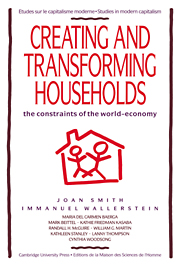A postscript on method
Published online by Cambridge University Press: 07 June 2010
Summary
In the studies reported here we have attempted quite broadly to measure the relative value to the household of the income accessible to it but derived from sources other than wages per se. The very nature of our study presented us with one of our fundamental problems. The usual precision associated with measuring the value of economic activities was altogether lacking.
There were the usual twin problems associated with large-scale historical studies of any kind: lack of data on many topics, and the incommensurability of the kinds of data that exist. But there was a more fundamental issue at stake, namely, how the range of analysis of economic activities may be extended beyond the set of assumptions that flow from and define the formal market. This issue goes to the heart of the intellectual and political debate that surrounds nonwage labor and its role in the capitalist world-economy.
The widely shared insight that non-waged work activities are as important to the world-economy as formally organized labor belies a striking inability or reluctance actually to measure that labor in such a way that comparisons may be made across place and time. The joke about the college professor marrying his housekeeper and thereby reducing the gross national product is no longer very funny. However, the absence of measurements of non-waged work is not simply the result of bureaucratic decisions but is entwined in the political definition of labor activities of every form.
- Type
- Chapter
- Information
- Creating and Transforming HouseholdsThe Constraints of the World-Economy, pp. 263 - 274Publisher: Cambridge University PressPrint publication year: 1992

